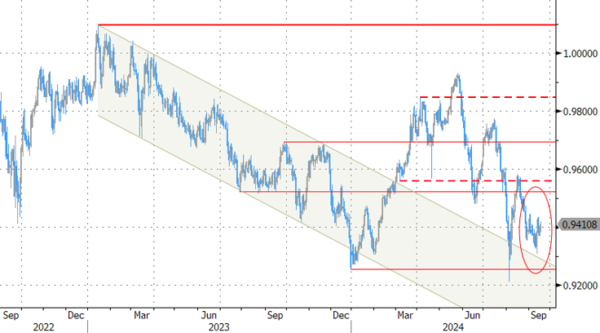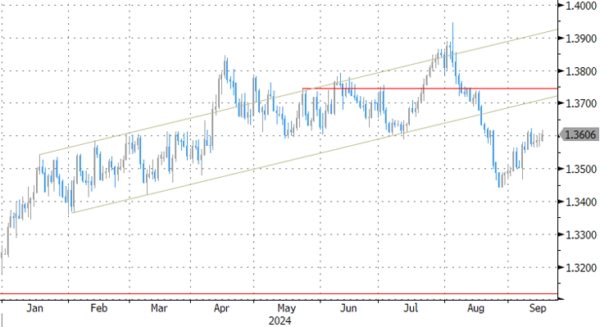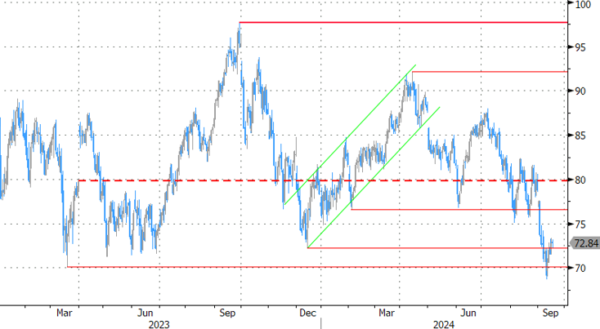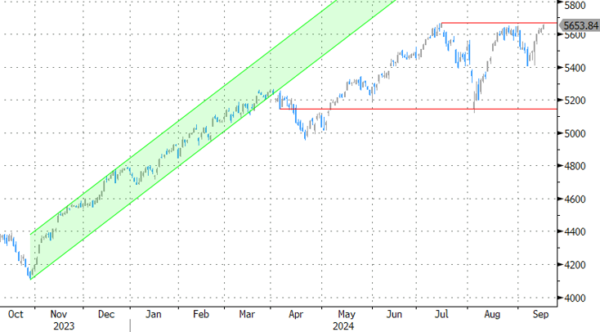Markets
US August retail sales served as some final input for tomorrow’s pivotal Fed meeting in a trading session that was otherwise simply the waiting game part 2. The series surprised to the upside on a headline level (0.1% m/m vs -0.2% expected). Core gauges printed close to or slightly below consensus with the control group (ex. food, building materials, car dealers and gas) rising 0.3%. Combined with some marginal upward revisions to both the July headline (1.1%) and control group (0.4%) series, we’d consider the release as a small beat of consensus. That triggered a little profit-taking spike in US yields, in particular at the front end, of which we doubt it’ll last through the US session. We suspect some technical influence as well with the likes of the 2-yr yield trading near the March 2023 support level ahead of the US retail sales release. Either way, money markets have positioned for the Fed and don’t plan to move around much. A 50 bps cut is still for 70% discounted. US yield changes vary between -0.8 (30-yr) to 3.7 bps (2-yr). German yields slid at the open before paring a significant chunk of or in some cases even fully recovering from the previous losses in choppy, directionless trading. Current moves range from -0.1 (30-yr) to +2.7 bps (2-yr) in a curve flattener. Industrial production numbers printed slightly better than expected too (+0.8% m/m vs 0.2% expected) but left an even smaller stamp on trading.
A separate bullet point for FX markets seems a bit unnecessary today. EUR/USD traded an extremely tight sideways range between 1.1120 and 1.1140. DXY tested the 100.6 support zone but prevents a break (for now). USD/JPY gains a few ticks to fill bids back above 141. 0.842-0.843, that was it for EUR/GBP today.
News & Views
An article published by news agency Bloomberg reports that Swiss watchmakers are urging the Swiss National Bank (SNB) and the government to take measures to cope with the strength of the Swiss franc. More specifically, the federation of the Swiss Watch Industry analyses that with inflation well below the 2% target, the SNB has room to maneuver and act on the foreign exchange market. It apparently also wants to SNB to reconsider currency interventions as it states that ‘an ad hoc and more reactive approach would make it possible to reduce volatility in the Swiss franc’. The calls come as a strong valuation of the franc coincides with easing global demand for some costly items, including watches. The SNB will have its next quarterly policy meeting on September 26. It cut its policy rate at the previous two meetings by 25 bps to currently 1.25% as inflation decisively returned to the 0.0%-2.0% target range. With both headline and core inflation at 1.1% Y/Y in August, the SNB is likely to ease policy further in September. Some market participants even raised the odds that Swiss franc strength could force the SNB to deliver a 50 bps cut later this month (+/- 40 chance discounted). After spiking to an all-time low near EUR/CHF 0.92 in the early august risk-off (except for the temporary spike after the removal of the CHF-cap early 2015), EUR/CHF currently trades near 0.94. This probably is stronger than what the SNB considers necessary to hold inflation in the middle of its target range.
Inflation in Canada in August declined 0.2% M/M bringing the Y/Y measure back tot the 2.0% target of the Bank of Canada for the first time since February 2021. The monthly decline in prices was rather broad-based with goods prices declining 0.3% compared to July, services prices easing -0.1% M/M and energy prices declining 1.6% M/M. Price growth in items related to shelter (0.4%) remains one of the components hampering the disinflation process. Core measures of inflation still eased further (core median from 2.4% to 2.3% Y/Y, core trimmed from 2.7% to 2.5%). The reaction of Canada yield markets to the release was modest (2-y bond yield -1.0 bp). Money markets now see an almost even chance for the BoC to step up the pace of easing from 25 bps to 50 bps at the October meeting as the BoC is giving more weight to the excess supply in the economy. In deciding on a bigger move, tomorrow’s Fed decision will also play an important role. The loonie eased modestly after the CPI release with USD/CAD moving back above the 1.36 barrier from 1.358 before the release.
Graphs
EUR/CHF: ongoing CHF strength is frustrating increasing part of Swiss corporate life
USD/CAD: loonie eases marginally after at-target CPI raises odds for bigger BoC cut in October
Brent oil took out a first minor resistance level but is now seeking catalysts for a further rebound from the recent lows
Slightly better than expected US retail sales push S&P500 on the verge of a new record high




